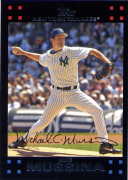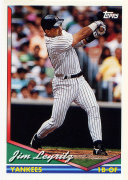Is Mike Mussina a Hall of Famer?
He’s a rich man’s [Jack] Morris. When people argue for Morris, they cite his ability to take the ball every fifth day without fail, pitch deep into games, and give his team a chance to win. Mussina did that, too, but he did it better, allowing fewer runs in a significantly tougher era for pitchers. From 1995 through 2003, Mussina averaged 222 innings pitched per year, topping the 200 mark in every one of those seasons (including in ’95, a strike-shortened year). During that time — the peak of the PED era — Mussina struck out about four times as many batters as he walked, and posted a 3.64 ERA that was 28 percent better than league average. Granted, Mussina was just the sixth-best pitcher in the game during that span, but there’s not much you can do when you’re pitching alongside five future Hall of Famers, three of them arguably among the five best pitchers of all time and the fourth with arguably the best two-season peak of any pitcher ever. Mussina was no stiff the rest of the time, either, ending his career with an ERA 23 percent better than league average, putting him on par with Marichal and ahead of Hall of Famers Phil Niekro, Fergie Jenkins, and the next guy on this list.
Jay Jaffe thinks Mussina belongs but it’ll be a long time before he gets there:
Two hundred and seventy is not 300, but even so, Mussina ranks 33rd all-time in wins, with a total higher than Hall of Famers Jim Palmer (268), Bob Feller (266), Bob Gibson (251) and 29 other enshrined starting pitchers. Moving beyond that — seriously, I’m done with the wins talk now — his 2,813 strikeouts rank 19th all-time and his 7.1 strikeouts per nine ninth among pitchers with at least 3,000 innings. That’s in part a product of pitching in an era where strikeout rates were almost continually on the rise, but it’s impressive nonetheless. Even more impressive is that his 3.58 strikeout-to-walk ratio is second only to Curt Schilling among pitchers with at least 3,000 innings since 1893, when the distance from the rubber to home plate was lengthened to 60-foot-6.
As for the postseason, Mussina may not have won a ring, but his 3.42 ERA in 139 2/3 innings is no small feat given the high-scoring era; it’s 0.26 lower than his regular season ERA, which itself was 23 percent better than the park-adjusted league average. Aided by the three tiers of playoffs during the bulk of his career, his 145 postseason strikeouts rank fourth all-time, while his 9.3 strikeouts per nine is second among the 22 pitchers with at least 100 postseason innings (Johnson is first at 9.8). Sadly, Mussina’s teams only won nine of his 23 postseason starts, because they supported him with just 3.1 runs per game; only four times did they even give him more than four runs. He had a few dud starts (three of less than five innings) among them, but it’s tough to pin his failure to win a ring on him.
As for the advanced metrics, Mussina stands tall thanks to his combination of run prevention and strikeouts (for which he doesn’t have to share value with his fielders). His 83.0 career WAR ranks 23rd all-time, ahead of 39 of the 57 enshrined starting pitchers; it’s 14th among post-World War II pitchers. That total is 1.6 above fellow candidate Glavine, who has an almost identical career/peak/JAWS line, and 10.4 wins above the average for enshrined starters. Mussina’s peak WAR of 44.5 doesn’t stack up as well; while it’s still 65th all-time, it tops only 20 enshrined starters and is 5.7 wins below the average one. Even so, his 63.8 JAWS is 2.4 points above the Hall average, good for 28th all-time, one spot below Schilling (64.4) and two above Glavine (62.9). He’s 132 spots higher than Jack Morris (38.4). His score beats those of 36 enshrined starters. He’s good enough for Cooperstown.
Mussina’s JAWS score beats those of 36 enshrined starters, and it will still be above the standard once Clemens, Maddux, Johnson, Martinez and Tom Glavine all get their due (the admission of those five would raise the respective bars to 75.1/50.7/62.9). He’s good enough for Cooperstown.
Still, the Moose won’t be loose in upstate New York anytime soon. On the contrary, Mussina probably has a long road before he gets a bronze plaque. In such heavy traffic, it’s probably asking too much even to hope that he approximates Schilling’s 38.8 percent debut last year. But like the aforementioned Bert Blyleven, a high-strikeout pitcher from an earlier era whose dominance over hitters and excellence in run prevention was initially overshadowed by his lack of Cy Young hardware, the numbers and the facts are on Mussina’s side. It’s just going to take some time for them to carry the day.






